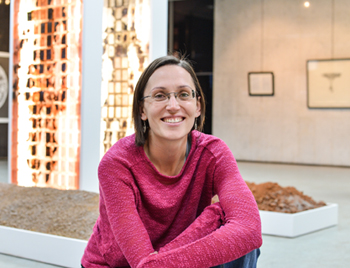Anxiety about losing a loved one to death culminates in runner-up prize at Sasol New Signatures Art Competition
 Adelheid Camilla von Maltitz
Photo: Supplied |
Adelheid Camilla von Maltitz – a lecturer at our Department of Fine Arts – has been awarded the runner-up prize at the Sasol New Signatures Art Competition. Her sculptural piece, ‘Bodies’, explores the process of mourning and loss and the grey areas between life and death.
The Sasol New Signatures Art Competition is recognised as the country’s longest running art competition. The competition has kick-started the careers of some of South Africa's most prominent artists. Last year, the competition was won by another Kovsie, Dot Vermeulen.
“Personally, I experienced an intense and consistent sense of anxiety towards death, specifically an anxiety towards losing a loved one due to a road accident. This led me to wonder how an individual copes with substantial loss. During my practical research it became obvious that there are many contrasts existing in the mourning process, contrasts related to anxiety and peace,” said Von Maltitz.
The piece encourages contemplation on three levels.
At the first level, two boxes lie on the floor covered in heaped earth and ash which suggests a buried body: closed, powerless and dark. Here, Von Maltitz invites the viewer to use this space to contemplate the process of mourning and loss.
The second level offers fragmented apparitions displayed in the light boxes, commenting on the ‘grey area’ between life and death.
At the third and final level, the viewer stands between the light boxes: open, alive and powerful.
Von Maltitz is currently reading for her PhD in Fine Arts at Kovsies. Commenting on her research, Von Maltitz said that she is “also interested in comparing the use of repetitive actions – such as revisiting a grave, which seem present in the mourning process – to the use of repetition in sculptural installation.” She is also interested in the relationship between these repetitions and anxiety and relieving anxiety, either permanently or temporarily.